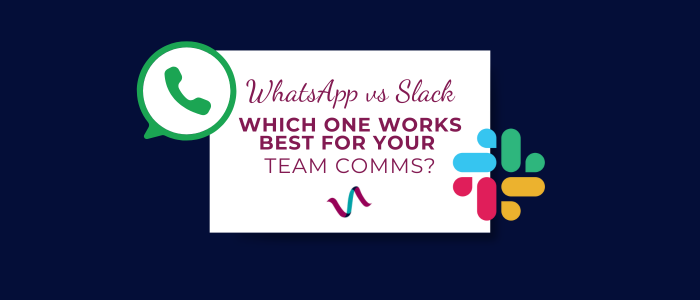WhatsApp vs Slack: Which One Works Best for Your Company Team Comms?
Let’s face it — as a small business owner, you just want your team (or your clients) to get the message. Whether it’s confirming an appointment, chasing a document, or sharing files, communication is everything. But choosing the right tool for the job? That’s where it gets murky.
Two of the most common names we hear from clients are WhatsApp and Slack. They both get the job done — but in different ways. One is a familiar, fast-moving chat app; the other is more structured and designed for teams.
What’s the difference?
WhatsApp: Fast and Familiar
Most of us already use WhatsApp in our personal lives. It’s instant, easy, and doesn’t require a new login or learning curve. For solo business owners or micro teams, it can feel like the simplest solution — especially if you’re communicating with clients who already use it.
However, if you’ve had to use WhatsApp Group Chats in business, family or other organisations you’re part of, you’ll most definitely know that all those notifications can become incredibly overwhelming and, ultimately, you will have muted, archived or deleted the busiest ones — making the decision that whatever you missed is far less traumatic than facing any more ‘pinging’… Clearly, that isn’t an option when WhatsApp is the chosen method of comms within your business.
Pros:
- Quick setup
- Most people already use it
- Great for casual or one-off client communication
Cons:
- Chats get buried quickly in busy groups
- No task integration
- Harder to separate work and personal messages
- Limited ‘pin’ functions
Slack: Organised and Scalable
Slack is built for team communication. You can set up different channels for different topics, projects, or departments — which helps reduce inbox overload and keeps conversations focused.
Additionally, the notification — be that on desktop, laptop or mobile — is a really pleasant, unobtrusive yet clear sound (personal preference, of course!). Slack also tracks conversations within chats — a bit like an email chain, only clearer. It also has the benefit of emojis, the same way WhatsApp does, but keeps it to the obvious.
Pros:
- Channels keep chats organised
- Powerful search and file sharing
- Integrates with tools like Google Drive, Trello, and Zoom
Cons:
- Can feel overwhelming at first
- Another app to manage (and learn)
- Clients might not want to join your Slack
So, which one should you use?
Use WhatsApp if you:
- Only need to check in with clients occasionally
- Work solo or with a VA and prefer fast responses
- Want a low-maintenance way to stay in touch
Use Slack if you:
- Have multiple team members or projects
- Need better control over how you manage work conversations
- Want integration with your business tools
Final Thoughts
It’s not about which one is better — it’s about what works for you and your team. WhatsApp is great for informal, fast communication. Slack offers more structure if your team is growing or your client work is more complex.
Of course, if you’re using Google Workspace or Microsoft Teams, they have team comms systems in-built, and you may be trying to keep all of your conversations with your team strictly within this format.
For us, we’ve found a good mix of what works best and learned to set notifications to what is most efficient — so less gets missed while avoiding overwhelming harassment!
Whatever you choose, make it work for the way you do business — not just what’s trending.
Need help setting up better internal systems or managing growing team communication? We’d love to help. Just drop us a message and we’ll walk you through it — no pressure, no jargon.
